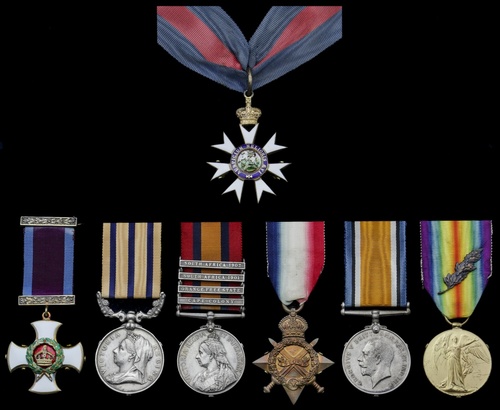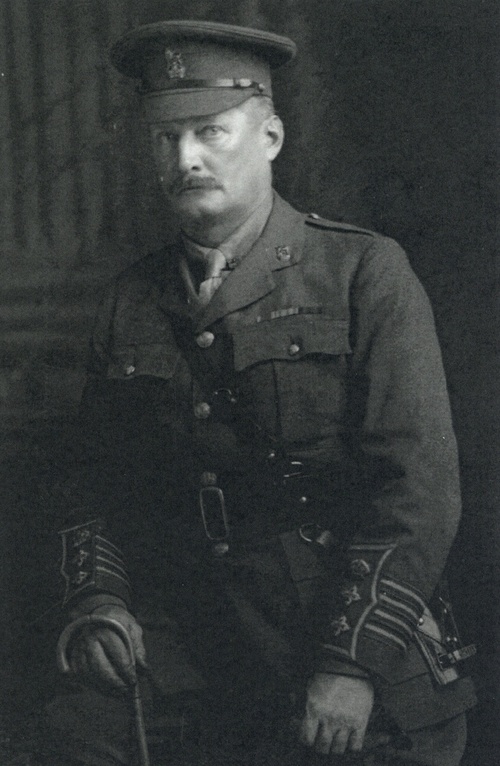Auction: 19002 - Orders, Decorations and Medals
Lot: 367
A Great War 'Gallipoli' C.M.G. and very rare 'Rhodesia 1896' D.S.O. group of seven awarded to Colonel C. H. Hale, Royal Army Medical Corps, thrice mentioned in the course of his distinguished career
The Most Distinguished Order of St. Michael and St. George, C.M.G., Companion's neck Badge, silver-gilt and enamel; Distinguished Service Order, V.R., silver-gilt and enamel, obverse centre depressed, reverse centre chipped; British South Africa Company's Medal 1880-1897, reverse Rhodesia 1896, no clasp (Surgn. Captn. C. H. Hale. Med. Staff.); Queen's South Africa 1899-1902, 4 clasps, Cape Colony, Orange Free State, South Africa 1901, South Africa 1902 (Major C. H. Hale, D.S.O. R.A.M.C.); 1914-15 Star (Col. C. H. Hale D.S.O. A.M.S.); British War and Victory Medals, with M.I.D. oakleaf (Col. C. H. Hale), some light edge wear from display mounting, very fine, housed as mounted upon a velvet tray, originally fitted within a glazed case (7)
One of 7 D.S.O.s issued for the Rhodesia 1896 operations.
C.M.G. London Gazette 2 February 1916:
'For services in Gallipoli.'
D.S.O. London Gazette 7 May 1897:
'In recognition of services during the recent operations in South Africa 1896.'
Charles Henry Hale was born on 9 March 1863 at Eastbourne, Sussex and educated at Plymouth Grammar School and St. Mary's Hospital, qualifying in 1884. After acting as Assistant Medical Officer at the Salop and Mongomery Counties' Asylum, he entered the Army as a Surgeon and became Captain with the Army Medical Staff on 5 February 1887.
Rhodesia - D.S.O.
Sent to South Africa in 1890, Hale saw extensive active service during the 1896 operations in Rhodesia. He is mentioned on numerous occasions in With the Mounted Infantry and the Mashonaland Field Force, 1896, by Lieutenant-Colonel E. A. H. Alderson, who takes up the story:
'On the 15th [July] we heard of the arrival at Fontesvilla of a detachment of 4 officers and 150 men of the West Riding Regiment, 1 officer [Hale] and 6 men of the Medical Staff Corps, and 2 men of the Army Service Corps.
[October] Fifteen casualties in the three days. Quite enough, considering the size of the force, to give me plenty to think about as we rode back to the laagers that evening. It was during this ride that I realized how much less pleasant it is to direct operations, and to say to one officer, "Take your men there", to another, "Attack that kopje," etc., than it is to receive such orders and then to say to your own little lot of men, "Come on." The latter is exhilarating, like a good run with hounds in a stiff country; the former is like seeing a dear friend ride a steeplechase over a severe course on a bad horse.
One thing in the three days' fighting I am sure of, and that is, that the wounded could not under the circumstances have been picked up quicker, or made more comfortable than they were under the arrangements made by Surgeon-Captain Hale.'
Hale was then appointed in Medical Command for the Lomagundi and Sinoia Column numbering some 306 men, which set off on 24 October. Alderson continues:
'On the 26th we came upon the first traces of the murders in the Lomagundi district. Our midday outspan was near the Sange River, and there we found two skulls, some bones, and some partly burnt letters from Jameson, the Mining Commissioner of the district, who was supposed to have been murdered. Hale pronounced one of the skulls to be that of a white man, so we took it with us and buried it next day at the store.'
He would follow this grissly discovery with being tasked to scout and explore the Native Commissioner's Camp whilst Alderson went to the Ayrshire Mines. Hale was duly 'mentioned' (London Gazette 9 March 1897, refers) besides being granted the D.S.O., which he received from the hands of Queen Victoria at Windsor Castle on the 19 May 1897.
Further campaigns - heartbreak
Advanced Major on 5 February 1899, Hale served in the Boer War, taking part in the operations in the Orange River and Cape Colony from March 1901-31 May 1902 (Medal & 4 clasps). With his career advancing well, his personal life would sadly subside. His wife, with whom he had one daughter, had begun an affair with Colonel E. R. Murray, D.S.O., Imperial Yeomanry, whilst he was away in South Africa. The case came before the Divorce Court in 1904, with the details of the tryst read aloud. Justice Barnes granted a divorce.
Advanced Lieutenant-Colonel, 7 June 1911 and Colonel, 1 March 1915, he served during the Great War in Gallipoli during 1915. Appointed Assistant Director of Medical Services from 28 April-28 December 1915 and Deputy Assistant of Medical Services, 9th Corps, to the evacuation of Sulva Bay, he was then Deputy Director of Medical Services, 8th Corps, until the evacuation of Cape Helles.
Hale latterly served as Deputy Director of Medical Services with the Egyptian Expeditionary Force and retired on pay on 23 May 1917. He had finished the war with a C.M.G. and a brace of 'mentions' (London Gazettes 28 January & 13 July 1916, refer).
The Colonel died at the River Yealm Hotel, Newton Ferrers, Plymouth on 20 July 1921, leaving his brother, Colonel G. E. Hale, to claim his Great War entitlement. His will left £5,037, which included two boxes containing a pair of guns, silver and saddles to St. Dunstan's Hostel for the Blind, £500 in trust to his grandson and £100 to the Salvation Army (Sheffield Daily Telegraph 28 September 1921, refers).
Subject to 20% VAT on Buyer’s Premium. For more information please view Terms and Conditions for Buyers.
Sold for
£4,000
Starting price
£3800







